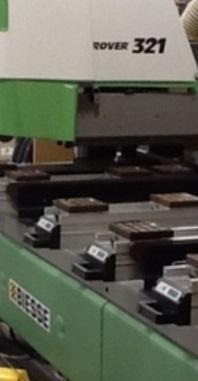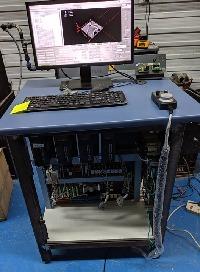Retrofit process for Biesse 321R
- faeluke
-
 Topic Author
Topic Author
- Offline
- Junior Member
-

- Posts: 24
- Thank you received: 5
- Several posts have discussed booting the old machine and pulling information from it. What are the pros and cons?
- What information can I get from booting the old computer and running the old software?
- How are pod and rail zones handled in LinuxCNC?
- What is the best order to take in a retrofit?
1. RTFM
- I think it is best to be reading for meaning, As this is my first retrofit, what am I looking for, besides how it all goes together?
- Connect the Estop loop up first.
- Tuning Servos
- X
- Y
- Z
5. Tool changes
- Drill selection
- ATC
I would be interested in any advice, questions, comments or concerns.
Please Log in or Create an account to join the conversation.
- tommylight
-

- Away
- Moderator
-

- Posts: 21345
- Thank you received: 7284
Not sure what is the benefit of the first besides bellow mentioned, can get plenty of info but as far as i can tell not much use for the second, no idea for the third, and take it easy and read a lot for the fourth.
- Several posts have discussed booting the old machine and pulling information from it. What are the pros and cons?
- What information can I get from booting the old computer and running the old software?
- How are pod and rail zones handled in LinuxCNC?
- What is the best order to take in a retrofit?
Powering on the machine and checking that the drives are fully functional is a good idea, can save a lot of headache, also checking the sensors and tool changer with detailed procedure for a tool change and homing the changer, valves, e-stops, etc. Then using a DVM to find and measure power supplies and what exactly they supply, how the security features are implemented, etc.
Then when the time to start retrofitting comes, have a look at this, it has plenty of info about the procedures required and wiring and testing:
forum.linuxcnc.org/10-advanced-configura...ning-detailed-how-to
Please Log in or Create an account to join the conversation.
- faeluke
-
 Topic Author
Topic Author
- Offline
- Junior Member
-

- Posts: 24
- Thank you received: 5
Given that this is my first Rodeo...Powering on the machine and checking that the drives are fully functional is a good idea, can save a lot of headache, also checking the sensors and tool changer with detailed procedure for a tool change and homing the changer, valves, e-stops, etc. Then using a DVM to find and measure power supplies and what exactly they supply, how the security features are implemented, etc.
What are your thoughts on using a pair of 7I70 cards to sniff a boatload of digital signals as I exercise various functions of the machine?
Please Log in or Create an account to join the conversation.
- tommylight
-

- Away
- Moderator
-

- Posts: 21345
- Thank you received: 7284
Using them as logic analyser ? Nice idea !What are your thoughts on using a pair of 7I70 cards to sniff a boatload of digital signals as I exercise various functions of the machine?
They are pretty slow compared to the real thing, but then the real thing that can handle 32V on the inputs is north of $$$$ <have no clue> and sure as hell having 48 inputs would send that price skyrocketing faster than SpaceX !
The important thing is for this purpose it will do just fine, and 1 should be more than enough, it does have 48 inputs and i doubt you can monitor more than one part of the machine at any given time.
Please Log in or Create an account to join the conversation.
- faeluke
-
 Topic Author
Topic Author
- Offline
- Junior Member
-

- Posts: 24
- Thank you received: 5
The important thing is for this purpose it will do just fine, and 1 should be more than enough, it does have 48 inputs and i doubt you can monitor more than one part of the machine at any given time.
Just from a sanity point, I was thinking of only monitoring 1 section at a time. In the retrofit, I was potentially going to use two 7I70s in different parts of the machine in an attempt to reduce the amount of cabling from the control unit to the machine. This wires up the units and starts the process while I learn more about the machine.
When I started to consider your comments and my lack of knowledge of how a pod and rail machine works, the idea of using the 7i70 cards as a logic analyzer seemed like a means to an end. I have a couple of high-end oscilloscopes that I can use to get real-time measurements if the need arises.
Please Log in or Create an account to join the conversation.
- bevins
-

- Offline
- Platinum Member
-

- Posts: 1942
- Thank you received: 338
Good idea to see any error messages on drives, inverters etc......
I use 7i70 and 7i71 alot with 7i74 and 7i77. I have done a Biesse 321, 346, 20 and a few other Biesse's.
Good to have schematics. I am doing a remote retrofit on a Biesse rover 20 now. Biesse has great schematics and wire labels.
Real easy to follow, especially their pre green lite loop.
Please Log in or Create an account to join the conversation.
- bevins
-

- Offline
- Platinum Member
-

- Posts: 1942
- Thank you received: 338
point to point they call it, which is difficult to replicate but not really needed when using a good cam.
Please Log in or Create an account to join the conversation.
- faeluke
-
 Topic Author
Topic Author
- Offline
- Junior Member
-

- Posts: 24
- Thank you received: 5
I had read most of your posts before I decided to buy the machine. In the back of my mind, I have been thinking that this road has been traveled before and that voices of reason will guide me back onto it when I take inevitable wrong turns.
The machine is now in my garage and I am in the process of setting it up for power on. I will post pictures in another thread. I agree that the Biesse schematics are very well labeled. I spent a couple of hours doing the overview of them this morning. I have the full stack of manuals along with Biesse software with the parallel port hardware key, and customer training manuals. I am in overwhelm mode now.
Tommy's post had convinced me to do the power-on last week, I appreciate the second opinion in that direction. There appears to be quite a safety loop on this thing and clearing all the hurdles makes sense. My Tool changer is different and I want to understand how that was implemented so that the process of making it work in LCNC goes smoothly.
It appears that the rails are tied into the serial outputs of the XNC compact, in your 321R retrofit, are the displays connected?
Do you think there is any benefit to documenting the XNC serial bus protocol?
Please Log in or Create an account to join the conversation.
- bevins
-

- Offline
- Platinum Member
-

- Posts: 1942
- Thank you received: 338
Thanks, Bob!
I had read most of your posts before I decided to buy the machine. In the back of my mind, I have been thinking that this road has been traveled before and that voices of reason will guide me back onto it when I take inevitable wrong turns.
The machine is now in my garage and I am in the process of setting it up for power on. I will post pictures in another thread. I agree that the Biesse schematics are very well labeled. I spent a couple of hours doing the overview of them this morning. I have the full stack of manuals along with Biesse software with the parallel port hardware key, and customer training manuals. I am in overwhelm mode now.
Tommy's post had convinced me to do the power-on last week, I appreciate the second opinion in that direction. There appears to be quite a safety loop on this thing and clearing all the hurdles makes sense. My Tool changer is different and I want to understand how that was implemented so that the process of making it work in LCNC goes smoothly.
It appears that the rails are tied into the serial outputs of the XNC compact, in your 321R retrofit, are the displays connected?
Do you think there is any benefit to documenting the XNC serial bus protocol?
Many have been down that road of trying to reverse engineer. No one to my knowledge has achieved this and most fall back on scrapping the rs485 modules. proprietary protocol really fast and just not worth the time and effort. Especially if you don't do this daily would take forever to figure out.
The key to these machines is the front end logic with the green light and push button. Powerup and try to get a green light. You will see all the mag switches and such the estop loop and emerg ropes etc all chain on this loop that needs to be clear before you can do anything else on this machine.
I am doing a rover 20 now and just got the pre loop figured out. just some thoughts.
After that it is just getting the spindle/vfd worked out, usually pot emu interface works well and enabling the drives and getting the control to the drives. After that input/outputs and then remapping for tool change.
That's about it... lol
Please Log in or Create an account to join the conversation.
- bevins
-

- Offline
- Platinum Member
-

- Posts: 1942
- Thank you received: 338
I use 7i70 and 7i71 along with 7i74 and put the 7i70,7i71 in the machine and not in the control panel.
I have done Biesse 346 with over 120 inputs and 98 outputs. I had boards all over the machine. The 7I74 is nice so you can put up to 8 i/o cards so you would have plenty of I/O. The scanning of the inputs is not a problem for the CNC machines because it is not really time eccentric in a since. So no problem with those cards using for I/O for your Biesse machine.
Please Log in or Create an account to join the conversation.
